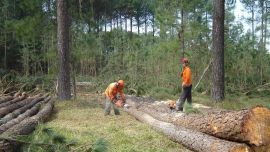A senior delegation from the United States Department of Energy will visit Buenos Aires next week for a series of meetings. The University of Buenos Aires’ Centre for the Study of Energy Regulatory Activity (CEARE) and the Institute of the Americas will host the delegation on May 8 at our annual Energy Roundtable. It will be an important occasion to further strategic dialogue on energy and minerals between the two nations that begun earlier this year.
To not “bury the lede,” a strategic dialogue must begin by accompanying Argentina’s ongoing processes of reducing its country risk rating and the recovery of investor confidence. It is essential to manage questions around investment protection.
For our engagement and the upcoming visit, there should be a clear focus on energy, mining and natural gas and liquefied natural gas (LNG). It is imperative for the new administration and private sector to seek out mechanisms for increasing investment, policies that enhance institutional capacity and those that advance the viability of the market and managing regulatory risk. For example, are there other regulations besides the proposed RIGI (Régimen de Incentivos para Grandes Inversiones) to minimise investment risk?
Moreover, both governments should endeavour to update and make clear the status of Bilateral Investment Treaties (BITs). It is worth noting that the ongoing process of gradually normalising energy and public service tariffs that reflect true costs while incentivising the rational use of resources is important for investor confidence and transparency.
Further, there may be no more important geopolitical aspect than the topic of energy transition minerals, but particularly lithium and copper. There has been a great deal of debate and discussion regarding Argentina’s leveraging of the United States Inflation Reduction Act (IRA), or more accurately, the avenues for accessing IRA programmes, particularly fiscal and tax benefits.
The bad news is that since Argentina does not have a current free-trade agreement (FTA) with the United States, most of the programmes and benefits afforded by the IRA are unattainable. The good news is that there may be a variety of other alternatives, including a version of an agreement that Japan signed with the United States, not to mention the Critical Minerals Partnership advanced by Washington.
The role of natural gas as a tool for decarbonisation is a crucial aspect of the ongoing energy policy debate globally and has tremendous resonance in Argentina and for the hemisphere’s energy security discourse. The potential for advancing decarbonisation efforts through the strategic utilisation of natural gas resources is important. Natural gas can serve as a transitional fuel to facilitate a shift away from more carbon-intensive sources, particularly in legacy infrastructure cases by displacing liquid fuels in the Southern Cone, for example in the mining, transport, and even power sectors. Natural gas offers a cleaner alternative for industries, thus aiding in reducing emissions intensity across the region. However, methane emissions are of great concern and must be addressed further and more profoundly.
Argentina boasts abundant natural gas reserves presenting an opportunity to propel the energy transition forward. This is particularly the case when it comes to under-utilised regional infrastructure and networks. But to properly reboot the role of natural gas for regional energy integration, with Argentina and specifically, Vaca Muerta at the core, the administration and private sector must continue to regain the confidence of neighbours as importers.
In the medium and longer term, the opportunity and potential for Argentina to become a global player by way of liquefied natural gas (LNG) and to export energy security beyond South America, perhaps to Europe, is a reasonable prospect.
Finally, we also believe that formalisation of the issues at the core of our efforts would greatly advance the bilateral relationship and enhance energy transition and decarbonisation efforts. Specifically, we propose the two nations consider launching an ‘Argentina-US Bilateral Energy Forum.’ It could be modelled on similar bilateral agreements that the US has developed with countries across the hemisphere such as Brazil.
Beyond market and investment climate aspects, the bilateral forum could set forth collaboration on areas such as:
– Methane abatement and management to enhance the international competitiveness of natural gas and LNG from Argentina.
– Critical mineral development with an emphasis on lithium and leveraging inclusion into the US’s IRA framework.
– Increased clean energy and EV deployment.
– Infrastructure to deliver clean energy; transmission and distribution assets, along with EV charging with the overarching goal of grid reliability.
– Investments and inputs to position Argentina as a reliable supplier of low carbon products, such as green fertilisers or other e-fuels derived from green hydrogen.
Whether a formal bilateral framework is derived from the upcoming visit, our institutions, members and stakeholders remain committed to fostering a deeper and more robust relationship between the United States and Argentina.
Our regional energy security and decarbonisation pathway will only be enhanced by such collaboration.
* Vice-President, Energy & Sustainability, Institute of the Americas
** Vice-Dean, School of Engineering, University of Buenos Aires and President of Centro de Estudios de la Actividad Regulatoria Energética (CEARE)
related news
by Jeremy M. Martin* & Raúl Bertero**

























Comments